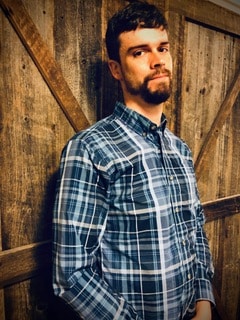
By Meghan Brown, CCV
Kyle Wolfe refused to let his past dictate his future.
In 2007, he was trying to figure out what he wanted to do with his life. He took two classes at CCV but failed both due to his substance use disorder and criminal deviance. After years of substance abuse and a 30-day incarceration, he came into recovery in 2015 with help from the federal government.
“It was more humanizing than my addiction…it’s what I needed,” Wolfe said about the time he served. Since then, Wolfe has used his experiences as motivation to get an education and help others.
He graduated from CCV at the end of summer 2020 with an associate degree in Human Services and is currently a full-time student at Castleton where he’s pursuing a degree in social work.
For Wolfe, CCV was the most practical starting point for a college education.
“I don’t think a normal university would have accepted me at the time,” he said. “I couldn’t spell very well, I didn’t have those basic math skills. I had to get my brain so I could remember stuff and think critically, all of which I didn’t know how to do after using substances.”
At CCV he was able to take classes that built up these skills and work with instructors who adopted a teaching style that best fit his needs. Rather than just giving him exams in the form of quizzes that test your memory, they allowed him to write papers about his work and how it related to what he was learning in class. Wolfe said that his instructors “went above and beyond” and were training him for the workforce.
“The reason I valued my education at CCV so much is because a lot of my instructors had worked in the field for 20 or 30 years, and they knew how to apply what I was learning at CCV.”
While he was a part-time student, Wolfe also worked in the community. He held jobs as a residential counselor at a recovery home for people with substance use disorders and at the Howard Center, where he worked with adults with severe mental health diagnoses.
“What I really liked about my experience at CCV was more or less the way they were training me. A lot of the instructors taught me or encouraged me to do things.”
Wolfe was able to pair his education at CCV with the work he was doing in substance use and mental health by talking with his instructors about what he was doing at work and getting their input on how he could be more effective in his roles.
CCV also offered a diverse learning environment, which added to the value of his education, he said. As a student at CCV-Winooski he was on a campus with students from different backgrounds ranging from low income, first generation, and people of color to single moms, New Americans, and students with disabilities.
“I think it’s the most diverse campus in the state. So for a social worker [in training] to be able to go there and learn was really cool,” he said. He also had diverse learning experiences through on-ground classes, online classes, an 80-hour internship at a restorative justice center, volunteer experience at a homeless shelter, and a day-long job shadow in adult mental health.
“That way of teaching just really prepared me for the workforce and worked well for me,” he added.
CCV also helped prepare him for continuing his education at Castleton. When asked if transferring to a four-year college was always his plan, he laughed, saying, “No, I was just hoping to maybe get an associate degree and work as a mental health tech or something.”
But with the encouragement of the instructors at CCV and his co-workers at the recovery home, he made the leap and decided to pursue a bachelor’s in social work. The skills he learned at CCV, namely how to write good papers, use Microsoft Word and Excel, study for tests, learn online, and gain an understanding of broader social work concepts, prepared him well. After taking classes at CCV part-time over the course of three years, he said “It’s been a transition adjusting to a more traditional university full-time,” but he felt that he was well prepared.
His plans for his future now stretch far beyond getting his degree. After earning a bachelor’s degree he plans to do the accelerated master’s program in social work at UVM and then go into the workforce. His aspirations include working in a reentry program with people who have been incarcerated and are gang-affiliated to help them rehabilitate and create new family and community ties. He would also like to work on prison advocacy efforts in Vermont, with an overall goal of decreasing the prison population, and continue work in a restorative justice center.



